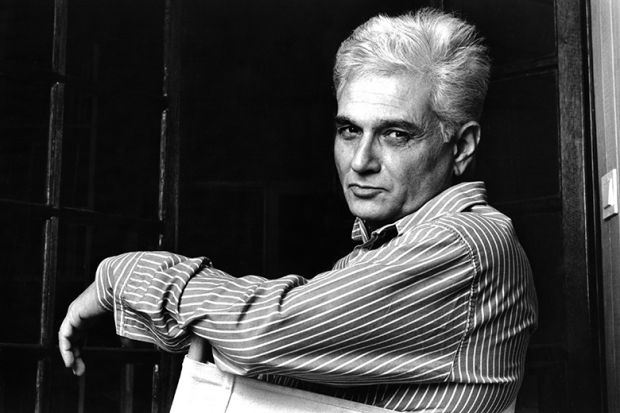Lately, it’s been common across the political spectrum to blame Jacques Derrida for the world going badly. Critics have claimed it’s the French philosopher’s fault that we’ve lost touch with reality, relativised morality and descended into conspiracism and post-truth. Peter Salmon, in a thrilling new intellectual biography, cites American literary critic Michiko Kakutani charging Derrida and co. with the rise of Donald Trump, Daniel Dennett calling such philosophy “truly evil” and the manifesto of Norway’s Anders Breivik, who committed mass murder to counter the effects on the West of “Derridean deconstruction”. Salmon could have cited plenty of other Derrida haters, too – Jordan Peterson, for instance.
By contrast, Salmon contends that “Derrida is one of the great philosophers of this or any age”. I agree. The scapegoating of Derrida has been depressing. The philosopher who showed better than anyone what it is to read carefully, scrupulously, and with a sense of the stakes involved has himself been barely and carelessly read. Those quick to condemn him cannot really have read him or they wouldn’t tag him with ideas and values that he nowhere espoused and often took pains to discredit. While, as Salmon acerbically observes, those who once claimed to admire him often seemed to prefer his words on their T-shirts than in his books: “The difficulty of reading him was negotiated by not doing so.”
Some of the gleeful blaming of Derrida for our world going badly is reminiscent of the trumpeting of those who, after the fall of the Berlin Wall, celebrated the end of history via the triumph of liberal democracy. In response to the celebratory assumption that not only was Marx dead but that his grave could finally be danced upon, Derrida, in his extraordinarily prescient Specters of Marx, pointed to a “world going very badly” and to the forces of repression and denial required not to notice. He made these points not as a Marxist, however, any more than he did as a Freudian. Rather, he was a philosopher unusually alive to all the influences upon him and to the ways in which some things never die – such as the demand for justice.
“‘Adopting equivocality’,” Salmon writes, “is perhaps as close as Derrida gets to a call to arms.” Derrida, it’s true, never fitted in comfortably with mass politics. Yet, as the philosopher Alain Badiou (who does) put it perceptively, “Derrida was what I call a brave man of peace. He was brave because it takes a lot of courage not to enter into division as it is constituted. And he was a man of peace because identifying what excepts itself from that opposition is, as a general rule, the road to peace.”
Now, then, when entrenched oppositions and hierarchies have not ceased to ensnare our capacity for meaning, is no time to dance on Derrida’s grave. The demand for deconstruction has never died. Thanks, therefore, to Salmon, who could hardly have written a timelier reminder that Derrida’s “thinking is a crucial component of any future philosophy; that his thinking is immediately – always already – applicable to the world as we find it; and that this application has political heft”.
Devorah Baum is an associate professor in English literature and critical theory at the University of Southampton and is working on a book about marriage.
An Event, Perhaps: A Biography of Jacques Derrida
By Peter Salmon
Verso, 320pp, £16.99
ISBN 9781788732802
Published 13 October 2020
POSTSCRIPT:
Print headline: Reconstruction of a reputation
Register to continue
Why register?
- Registration is free and only takes a moment
- Once registered, you can read 3 articles a month
- Sign up for our newsletter
Subscribe
Or subscribe for unlimited access to:
- Unlimited access to news, views, insights & reviews
- Digital editions
- Digital access to THE’s university and college rankings analysis
Already registered or a current subscriber? Login







